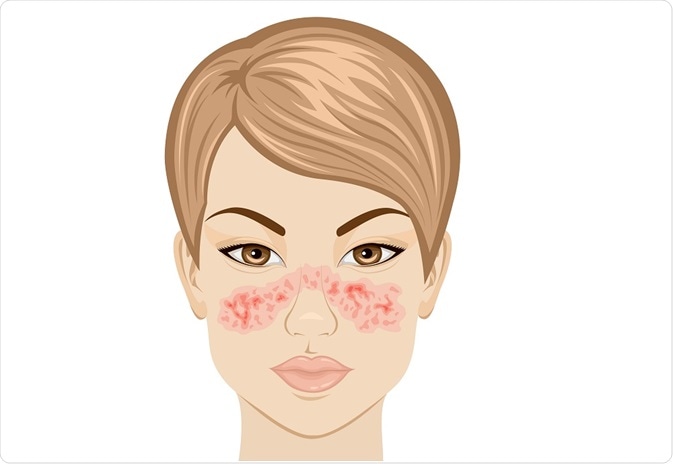Lupus Diagnosis

Lupus is a chronic inflammatory autoimmune disorder. Some symptoms of lupus can be transient such as joint and muscle pain, fatigue, a rash caused or made worse by sunlight, low-grade fevers, hair loss, pleurisy, loss of appetite, sores in the nose or mouth, or painful sensitivity of the fingers in cold environments.
 Scio21 | Shutterstock
Scio21 | Shutterstock
Lupus can often be misdiagnosed as other diseases. For this reason, lupus has often been called the "great imitator." Symptoms come and go, and are analogous to those of other conditions. No single test can tell if a person has lupus, but there are a range of other methods to diagnose lupus.
Types of lupus
There are several types of lupus, each affecting different subsets of patients:
- Systemic lupus – in which the immune system attacks healthy tissue
- Discoid lupus – an uncommon skin rash made worse in sunlight
- Drug-induced lupus – usually seen in older patients of 50-70 years old, with higher incidence rates in those who take daily medication in doses of 200 mg a day
- Neonatal lupus – caused by antibodies from the mother that affect a fetus, and is identified by cutaneous lupus lesions commonly on the face or scalp, or congenital heart block.
How is lupus diagnosed?
Medical history
Give your health care provider a complete and accurate medical history. This information, along with a physical exam and special tests, helps your health care provider to rule out other diseases that can be confused with lupus.
Symptoms
The American College of Rheumatology has outlined the following 11 symptoms that can aid in arriving at a lupus diagnosis. Doctors will expect patients to have four or more of the 11 symptoms of lupus. The symptoms can be those that the patient is currently experiencing, or ones that have been experienced since the onset of their illness.
Skin and hair symptoms
- Malar rash – butterfly-shaped rash over the cheeks or other rashes
- Skin rash appearing in areas exposed to the sun (photosensitivity)
- Loss of hair, sometimes in spots or around the hairline
- Discoid rash – red patches of skin due to the scaling of hair follicles
Joint symptoms
- Arthritis lasting for several weeks in multiple joints
Neurological symptoms
- Seizures, strokes, psychosis, balance problems
Hemotological symptoms
- Blood clots
- Leukopenia (low white blood cell count)
- Thrombocytopenia (low blood platelet count)
- Hemolytic anemia (reduced red blood cell count)
Renal symptoms
- Blood or protein in the urine or tests that suggest poor kidney function
Oral symptoms
- Sores in the mouth or nose lasting for more than a month
Serositis
- Inflammation of the tissues covering internal organs
- Abdominal pain
Other symptoms
- Fever, fatigue and weight loss
Lab tests
The Antinuclear antibody (ANA) test is a commonly used test for lupus diagnoses. An antibody is a chemical the body makes to fight off infections, while autoantibodies are produced when the immune system fails to differentiate between ‘self’ and ‘non-self’, and attacks the body’s healthy cells in error. This can cause tissue and organ damage.
The anti-dsDNA test targets the DNA found in a cell’s nucleus, and indicates the presence of autoantibodies in the blood. Most people with lupus test positive for ANA, even though it can be present in patients with a variety of other conditions. Other health problems, like malaria (a disease contracted from a mosquito bite), can also give you a positive test, which is why other tests can be necessary.
Other tests that can be undertaken are chest x-rays, for chest infections, urinalysis to monitor the amount of protein or blood in the urine that may indicate kidney problems, and serum creatinine tests, which measure the amount of creatinine in the blood, a waste product that forms when creatine in the muscles breaks down, a product that the kidneys usually eliminate. This test determines how well a patient’s kidneys are functioning.
Risk factors for lupus
Stress, infection and trauma can all increase a person’s risk of developing lupus. Although it isn’t currently known to what degree genes affect lupus incidence, some families have been known to carry genes that increase their risk of developing the condition.
Sources:
- www.bad.org.uk/shared/get-file.ashx?id=196&itemtype=document
- https://labtestsonline.org/tests/anti-dsdna
- https://resources.lupus.org/entry/about-neonatal-lupus
- https://www.lupusuk.org.uk/diagnosis/
- www.lupusuk.org.uk/…/
Further Reading
- All Lupus Content
- What is Lupus?
- Lupus Symptoms
- Lupus Flares
- Lupus Treatments
Last Updated: Nov 13, 2018

Written by
Lois Zoppi
Lois is a freelance copywriter based in the UK. She graduated from the University of Sussex with a BA in Media Practice, having specialized in screenwriting. She maintains a focus on anxiety disorders and depression and aims to explore other areas of mental health including dissociative disorders such as maladaptive daydreaming.
Source: Read Full Article